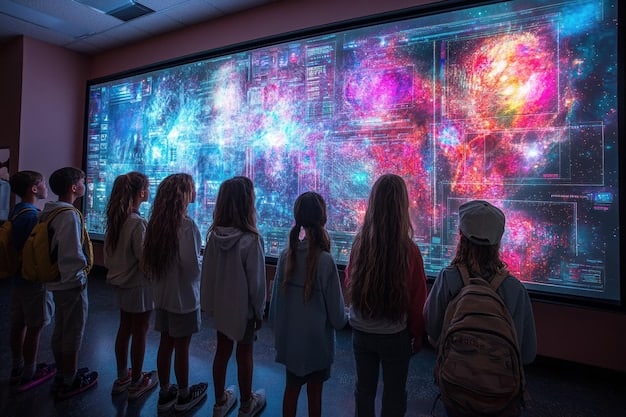Gen Z’s Impact: Shaping the Future of Education in US Schools

Gen Z is fundamentally reshaping the educational landscape in US schools and universities, driving a paradigm shift towards more flexible, technology-integrated, and personalized learning experiences that prepare students for a rapidly evolving global workforce.
The landscape of education is undergoing a profound transformation, largely spearheaded by the distinct characteristics and expectations of Generation Z. As these digital natives increasingly populate classrooms and lecture halls across the United States, they are not merely adapting to existing structures; they are actively dictating a new future for learning. This article delves into The Future of Education: How Gen Z is Driving Innovation in US Schools and Universities, exploring their influence on curriculum, technology integration, pedagogical approaches, and the very philosophy of what it means to be educated in the 21st century.
Understanding Gen Z’s Educational Psyche
Gen Z, broadly defined as individuals born between the mid-to-late 1990s and the early 2010s, represents the first generation to grow up entirely immersed in a digital world. This intrinsic relationship with technology has fundamentally shaped their cognitive processes, communication styles, and expectations for how information should be accessed and processed. For educational institutions, understanding this generational psyche is paramount to fostering engagement and effective learning.
Their comfort with digital interfaces and instant information access means they often prefer self-directed learning paths and a more personalized educational journey. They are less receptive to passive learning models and gravitate towards interactive, experiential, and collaborative methods. This isn’t simply a preference; it’s a reflection of how they’ve learned to navigate the world since childhood.
The Digital Native Advantage
Growing up with smartphones and social media has granted Gen Z an innate digital fluency. They seamlessly integrate technology into every facet of their lives, and education is no exception. This advantage translates into a desire for learning environments that mirror their daily digital interactions, demanding advanced tools and infrastructure.
- Hyper-connectivity: They expect instantaneous access to information, peers, and instructors.
- Multi-tasking proficiency: Often juggling multiple digital streams, they can process diverse information simultaneously.
- Digital literacy: Beyond mere consumption, they are adept at creating, curating, and sharing digital content.
Demand for Authenticity and Purpose
Unlike previous generations that might have prioritized rigid career paths, Gen Z often seeks a deeper sense of purpose and authenticity in their educational pursuits. They are acutely aware of global issues and societal challenges, desiring an education that equips them not just for a job, but for making a tangible impact. They question traditional authority and value transparency, making them less likely to blindly accept information without critical evaluation. Their engagement is often tied to relevance, asking “Why am I learning this?” and “How does this apply to the real world?” This mindset pushes educators to connect theoretical concepts to practical, real-world applications and ethical considerations.
The educational system must respond by demonstrating how learning contributes to a greater good, fostering critical thinking, and providing opportunities for students to apply knowledge to solve authentic problems, not just theoretical exercises. This approach not only enhances engagement but also cultivates a generation of socially conscious and responsible citizens. Institutions that embrace this shift are finding increased student satisfaction and better outcomes.
Technology as a Learning Cornerstone
For Gen Z, technology is not just a tool; it’s an extension of their learning experience, an omnipresent resource that facilitates information acquisition, collaboration, and creative expression. US schools and universities are increasingly recognizing this, moving beyond traditional chalkboards and textbooks to embrace digital ecosystems that resonate with this generation.
This integration goes far beyond simply using computers. It encompasses immersive technologies, data analytics for personalized learning, and platforms that enable seamless communication and content creation. The shift towards digital learning environments is a direct response to Gen Z’s comfort level and expectation of technology as an integral part of their daily lives.
Embracing Blended and Hybrid Learning Models
The pandemic accelerated the adoption of blended and hybrid learning, but for Gen Z, these models are a natural fit. They appreciate the flexibility to learn at their own pace and the ability to access educational content anytime, anywhere. This balance of in-person interaction and remote access caters to their independent learning styles and accommodates diverse schedules.

The appeal of hybrid instruction lies in its capacity to offer personalized learning paths. Students can review lectures online, engage in discussions asynchronously, and utilize in-person sessions for deeper practical work or personalized instructor feedback. This approach leverages technology to optimize both individual comprehension and collaborative learning experiences.
Leveraging AI and Adaptive Learning Systems
Artificial intelligence (AI) is rapidly becoming a transformative force in education, particularly in tailoring learning experiences to individual student needs. Gen Z, accustomed to personalized algorithms in their daily digital lives, expects similar customization in their educational content.
Adaptive learning systems, powered by AI, analyze student performance and learning patterns to recommend tailored content, identify areas for improvement, and provide immediate feedback. This allows students to progress at their own optimal pace, focusing on areas where they need the most support, while accelerating through concepts they quickly grasp.
- Personalized content delivery: AI curates resources based on individual learning styles and progress.
- Real-time feedback: Students receive immediate insights into their understanding, facilitating rapid correction.
- Automated assessment: AI can handle repetitive grading tasks, freeing up educators for more complex instructional roles.
AI tools are also being explored for more immersive applications, such as virtual tutors that can provide 24/7 support or AI-powered analytics that help educators identify at-risk students before they disengage. The potential for AI to optimize learning outcomes for a generation that thrives on personalization is immense.
Rethinking Pedagogy: Beyond Rote Learning
Gen Z’s digital fluency and their exposure to a vast amount of information online have rendered traditional, lecture-based, rote learning approaches largely ineffective. They seek active engagement, practical application, and immediate relevance in their education. This shift necessitates a complete rethinking of pedagogical strategies, pushing educators to adopt more dynamic and student-centric methods.
Educational institutions are moving towards models that foster critical thinking, problem-solving, and collaboration – skills deemed essential for success in a rapidly changing global economy. This involves a departure from passive information consumption towards active knowledge construction.
Project-Based Learning and Experiential Education
Project-based learning (PBL) resonates deeply with Gen Z’s desire for real-world relevance and hands-on experience. Instead of passively absorbing facts, students actively engage in projects that require critical thinking, research, collaboration, and creative problem-solving. This approach mirrors the collaborative and iterative nature of work in many modern industries.
Similarly, experiential education, which includes internships, simulations, and field studies, provides students with practical skills and insights that cannot be gained solely in a classroom. Gen Z values these opportunities to apply theoretical knowledge to authentic challenges, enhancing their understanding and preparing them for future careers.
Emphasis on Soft Skills and Critical Thinking
While academic knowledge remains important, the job market increasingly values soft skills such as communication, collaboration, adaptability, and critical thinking. Gen Z, aware of the dynamic nature of employment, recognizes the importance of these transferable skills.
Educators are now consciously integrating these competencies into the curriculum, moving beyond merely teaching content to fostering the abilities to analyze, synthesize, and evaluate information. Debates, group projects, and case studies are becoming more prevalent, aimed at developing sophisticated reasoning and interpersonal skills. The emphasis is on teaching students how to think, not what to think, preparing them for a future where adaptability and continuous learning are key.
Curriculum Evolution and Future-Proofing Education
The traditional curriculum, often criticized for being slow to adapt, is undergoing significant revisions to meet the demands of Gen Z and the future workforce. Educational institutions are recognizing that the skills required for success are evolving rapidly, necessitating a proactive approach to curriculum design.
This evolution is driven by the need to prepare students not just for current jobs, but for roles that may not even exist yet. It involves a focus on interdisciplinary studies, digital literacy, and global competencies. The aim is to create future-proof graduates who can navigate complex challenges and contribute meaningfully to society.
Interdisciplinary Approaches and Holistic Learning
Gen Z often sees the world in interconnected ways, blurring the lines between traditional academic disciplines. They are less interested in rigid subject silos and more in understanding how different fields intersect to solve complex problems.
This preference is driving a move towards interdisciplinary curricula that combine elements from various subjects, fostering a more holistic understanding of topics. For example, a project on climate change might integrate science, economics, ethics, and political science, reflecting the multifaceted nature of real-world issues.
STEAM and Digital Literacy Focus
The emphasis on Science, Technology, Engineering, Arts, and Mathematics (STEAM) is escalating, reflecting the growing importance of these fields in the digital age. Gen Z, being digitally native, is naturally inclined towards technology, and formal education is now bolstering this inclination with structured learning.
Digital literacy extends beyond mere computer skills; it encompasses data analysis, cybersecurity awareness, media literacy, and ethical digital citizenship. These skills are no longer optional but are fundamental for navigating an increasingly digital world, a truth Gen Z understands intuitively.
Global Competencies and Cultural Intelligence
In an interconnected world, global competence and cultural intelligence are crucial. Gen Z is inherently global in their outlook, exposed to diverse cultures through social media and international news. This translates into a desire for education that equips them to work effectively across cultural boundaries.
Universities are expanding international programs, promoting foreign language acquisition, and integrating global perspectives into various courses. The goal is to cultivate students who are not only knowledgeable but also culturally sensitive and capable of collaborating in a diverse global environment.
The Campus Experience and Student Well-being
Beyond academics, Gen Z’s impact on education extends to the very fabric of the campus experience. They bring unique expectations regarding community, support services, and work-life balance, influencing how schools and universities design their physical spaces and support systems. Their advocacy for mental health and inclusivity is reshaping student services, making well-being a central tenet of the educational environment.
Campus life is evolving to be more inclusive, flexible, and supportive of diverse needs, reflecting Gen Z’s broader societal values. This includes everything from housing options to counseling services, demonstrating a holistic approach to student development.
Demand for Mental Health Support and Inclusivity
Gen Z is open about mental health challenges and actively advocates for comprehensive support services. They expect schools and universities to provide accessible counseling, stress reduction programs, and a culture that destigmatizes mental health issues.
Furthermore, they prioritize diverse and inclusive environments. They champion equity, demand representation, and expect institutions to create spaces where all students feel safe, respected, and valued, regardless of their background, identity, or beliefs. This push for inclusivity impacts curriculum, campus policies, and social initiatives.

Flexible Learning Spaces and Community Building
Gen Z thrives in collaborative and flexible environments. They prefer learning spaces that can be easily reconfigured for group work, individual study, or informal discussions, moving away from rigid lecture halls. This often means more open-plan areas, comfortable seating, and integrated technology.
While digital connections are second nature to them, they also value strong in-person communities. They seek opportunities to connect with peers and faculty, participate in extracurricular activities, and build meaningful relationships that extend beyond the classroom. Institutions are responding by creating more communal spaces and fostering opportunities for peer-to-peer engagement and mentorship.
Challenges and Opportunities for US Education
While Gen Z drives innovation, adapting to their needs presents both significant challenges and transformative opportunities for US education. Institutions must navigate funding complexities, faculty resistance to change, and the rapid pace of technological advancements, all while ensuring equitable access and high-quality learning outcomes for all students.
The key lies in viewing these challenges not as obstacles, but as catalysts for necessary evolution. Embracing a growth mindset and a willingness to experiment are crucial for educational leaders.
Bridging the Digital Divide and Ensuring Equity
Despite Gen Z’s general digital fluency, significant disparities exist regarding access to technology and high-speed internet. The digital divide remains a critical challenge, particularly in underserved communities. Ensuring equitable access to digital learning tools and resources is paramount to achieving educational equity.
Opportunities lie in government initiatives, philanthropic partnerships, and institutional investments aimed at providing devices, broadband access, and digital literacy training to all students, regardless of their socioeconomic background.
Faculty Development and Adapting to New Pedagogies
For many educators, especially those trained in traditional methods, adapting to new technologies and student-centered pedagogies can be challenging. Resistance to change, lack of training, and limited resources can hinder the adoption of innovative approaches.
However, this presents an enormous opportunity for professional development. Investing in ongoing training for faculty to master blended learning techniques, AI-powered tools, and experiential education approaches is crucial. Empowering educators with the skills and confidence to embrace these changes will be key to successful institutional transformation.
The Evolving Role of Educators
The digital revolution positions educators less as purveyors of information and more as facilitators, mentors, and guides. For Gen Z, who can access information readily online, the value of an educator lies in curating content, fostering critical thinking, facilitating discussions, and providing personalized support.
This evolving role is an opportunity for educators to focus on higher-order thinking skills, emotional intelligence, and the development of character, areas where human connection and mentorship are irreplaceable. The future classroom will be a collaborative space: teachers and students learning and adapting together.
| Key Aspect | Brief Description |
|---|---|
| 📱 Digital Native Drive | Gen Z’s innate digital fluency reshapes learning towards tech-integrated, flexible models. |
| 💡 Pedagogical Shift | Move from rote learning to project-based, experiential methods, fostering critical thinking. |
| 🌍 Future-Proof Curriculum | Emphasis on STEAM, digital literacy, and global competencies for evolving job markets. |
| ❤️ Well-being Focus | Increased demand for mental health support, inclusivity, and flexible campus environments. |
Frequently Asked Questions About Gen Z’s Impact on Education
Gen Z primarily expects education to be highly relevant, technology-integrated, and personalized to their individual learning styles. They seek practical applications for their knowledge, preferring experiential learning over passive rote memorization. They also value clear connections between their studies and their future career aspirations or societal impact, demanding authenticity and purpose in their academic pursuits.
Technology is shifting teaching methods significantly by facilitating blended learning, adaptive systems, and AI-powered tools. This allows for more flexible content delivery, real-time feedback, and personalized learning paths tailored to each student’s pace and needs. Educators are evolving into facilitators, guiding students through digital resources and collaborative projects rather than solely lecturing.
Beyond traditional academic knowledge, skills like critical thinking, problem-solving, collaboration, and adaptability are gaining significant importance. Gen Z’s influence highlights the need for robust digital literacy, along with global competencies and cultural intelligence. Soft skills, including communication and emotional intelligence, are also becoming crucial as they prepare for dynamic, interconnected work environments.
Many US schools and universities are actively working to adapt, but readiness varies. While institutions are investing in technology, developing interdisciplinary programs, and expanding student support services, challenges remain. These include bridging the digital divide, providing adequate faculty training, and securing sufficient funding to implement comprehensive changes that meet the evolving demands of Gen Z effectively and equitably.
Gen Z openly advocates for comprehensive mental health support and destigmatization in educational settings. They expect accessible counseling services, stress reduction programs, and a campus culture that prioritizes student well-being. Their emphasis on inclusivity also extends to creating supportive environments where all students feel psychologically safe and respected, fostering a more holistic approach to student success.
Conclusion
The transformative influence of Gen Z on US education is undeniable, pushing schools and universities toward a future that is more agile, technologically integrated, and deeply student-centered. Their demand for personalized, purpose-driven learning, coupled with their innate digital fluency and strong emphasis on well-being, is reshaping pedagogical practices, curriculum design, and the very culture of academic institutions. While adopting these changes presents challenges, it also offers unparalleled opportunities to create a more dynamic, equitable, and effective educational system that truly prepares students for the complexities of the 21st century. The path forward involves continuous innovation, collaborative effort, and a keen understanding of this boundary-pushing generation.